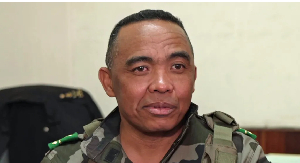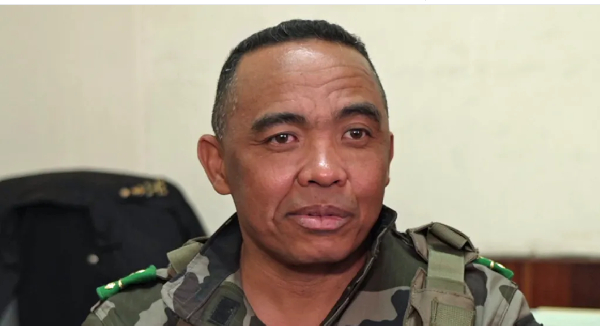 Randrianirina spent time in a maximum-security jail known for holding hardened criminals
Randrianirina spent time in a maximum-security jail known for holding hardened criminals
If you’d have asked about Col Michael Randrianirina on the island of Madagascar before last weekend, you’d have got a lot of blank looks.
In just three days, however, he has become arguably the most powerful person in country.
Randrianirina’s sudden ascent began on Saturday, when as the head of Madagascar’s elite CAPSAT army unit, he drove with his troops into the centre of the capital city, joining thousands of protesters who had long been demanding the president’s resignation.
After Andry Rajoelina eventually fled the city and MPs voted to impeach him, 51-year-old Randrianirina stood in front of the vacant presidential palace and informed the world’s media that CAPSAT was taking over.
The constitutional court then declared that he was the country’s new ruler, even though the ousted president still insists that he remains in charge.
Randrianirina carries a rare air of mystery – for the leader of the country’s most powerful military unit, there is not much information about him in the public domain.
What we do know is that he was born in Sevohipoty, a village in the southern Androy region.
He later became the governor of Androy, serving between 2016 and 2018 under former President Hery Rajaonarimampianina.
Then, Randrianirina became head of an infantry battalion in the city of Toliara, a position he held until 2022.
He was a vocal critic of Rajoelina, an entrepreneur who took power via a coup in 2009, stepped down in 2013, then returned five years later after winning elections.
Randrianirina was jailed in a maximum-security prison without trial in November 2023, accused of inciting a mutiny and planning a coup.
Student groups, fellow soldiers and politicians were among those who argued Randrianirina had been imprisoned for unfair political reasons, and he was released in February the following year.
Just hours before announcing he was taking over Madagascar on Tuesday, Randrianirina told the BBC he was a mere “servant” of the people. He exuded charm, hospitality, confidence – but not arrogance.
Magalasy journalist Rivonala Razafison describes him as “simple but tough”, “straightforward” and “patriotic”.
Randrianirina certainly has thoughts about his country and how it is still influenced by France, Madagascar’s colonial master until 1960.
When offered the option to respond to the BBC’s questions in French, an official language in Madagascar, Randrianirina countered: “Why can’t I speak my language, Malagasy?” adding that he does not like glorifying the colonial tongue.
The CAPSAT leader has told local media that, moving forward, his priority is “social welfare” – a pressing issue in a country where roughly 75% of people live below the poverty line.
He has said the military will rule for up to two years alongside a civilian government before an election is held.
Sources have told Reuters that Randrianirina will be sworn in over the next day or two – a ceremony that will serve as a coda to a whirlwind few days that took him from mystery man to the officer everybody is talking about.
